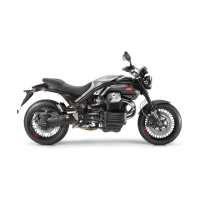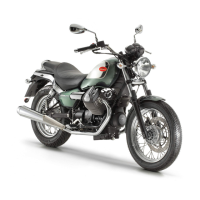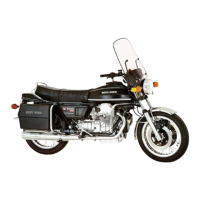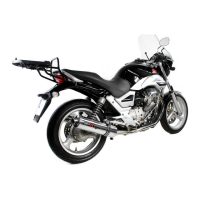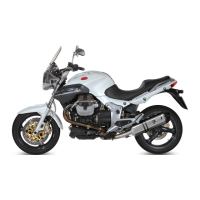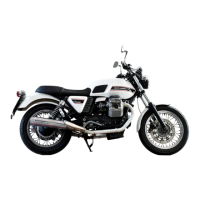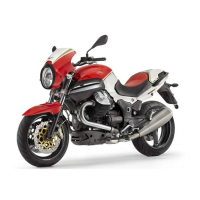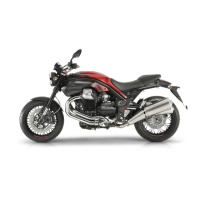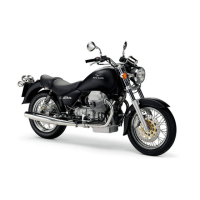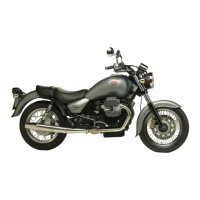Do you have a question about the MOTO GUZZI Daytona RS and is the answer not in the manual?
Provides instructions for overhauling and repairs, general checking operations.
Assists in stripping, checking, and assembling operations with drawings and tables.
Guides users to familiarize with manufacturing characteristics of component parts.
Text supplemented with schematic illustrations for quick reference and understanding.
Covers accident prevention, potential damage, and additional job information.
Specifies the use of Original MOTO GUZZI Spare Parts; non-original parts invalidate warranty.
Details key switch positions, indicators, odometer, and tachometer.
Describes operation of main light switch, dipped/main beam, and hazard warning lights.
Explains the push-buttons for horn, flashing lights, and turn signals.
Details the choke control for cold starts and its positions.
Describes the clutch lever's function for starting and gear changes.
Explains the starter button and engine stop switch operation.
Details how to operate the throttle control by turning the grip.
Describes the front brake lever and its connection to the master cylinder.
Explains the location and function of the rear brake pedal.
Details the operation of the gearbox control pedal for shifting gears.
Instructions on how to open the fuel filler cap and a note on fuel spillage.
Describes the motor-driven fuel pump and tap operation for fuel flow regulation.
Explains the electric fuel cock operation and its relation to the ignition switch.
Details the fuse box location, number of fuses, and their functions.
Explains how to adjust the steering damper's braking effect.
Describes the location and access to the storage compartment.
Details the helmet holder and a warning about using it while the engine is running.
Describes the function of the side stand arm for parking support.
Explains the side stand and its safety switch that prevents starting the motor.
Procedure for removing the driver seat using an Allen wrench.
Procedure for removing the saddle using the key.
Details how to use the passenger holding belt.
Instructions for checking oil level and performing an oil change.
Procedure for replacing the filter cartridge and cleaning the mesh filter.
Detailed steps for removing and washing the wire mesh filter.
Instructions for checking and changing the gearbox oil.
Procedure for checking and changing the rear transmission box oil.
Details greasing intervals, types of grease, and recommended lubrication points.
Specifies the interval and quantity for changing front fork oil.
Lists general greasing points and the recommended grease type.
Procedure for adjusting clutch lever free play and handle distance.
Details how to adjust the front brake lever distance.
Instructions for adjusting rear brake pedal idle stroke and position.
Ensures safe riding by adjusting steering for free movement without play.
Adjusting rebound and compression damping on the telescopic fork.
Adjusting spring pre-loading, rebound, and compression damping on shock absorbers.
Procedure to check, clean, and change the air filter.
Procedure to check, clean, and change the air filter.
Checking valve clearance between valves and rockers on a cold engine.
Specifies the replacement interval for distribution timing belts.
Ensuring correct headlight height for visibility and avoiding dazzling traffic.
Provides instructions and precautions for cleaning the windscreen.
Guidelines for preparing, washing, and drying the motorcycle.
Defines codes A=Maintenance/Inspection/Adjustment/Replacement, C=Cleaning, R=Replacement.
Periodic checks for electrolyte, lubrication, and oil/fluid changes.
Specific torque values for various fasteners on the Sport 1100 I model.
Specific torque values for various fasteners on the Daytona V10 Centauro model.
Illustrations and descriptions of specialized tools for maintenance.
Detailed list of specific tools with codes and descriptions for motorcycle maintenance.
Step-by-step procedure for disassembling the engine unit from the V10 Centauro frame.
Disassembly procedure for the engine unit from the frame for Sport/Daytona models.
Procedure for dismantling the engine assembly, including head cover removal.
Steps for reassembling the engine, emphasizing key points and warnings.
Procedure for checking and setting the timing system phases.
Detailed checks for cylinder heads, valve guides, and valve seats.
Checking valve springs for deformation and load loss.
Measuring cylinder diameter and checking piston/cylinder grading.
Checking piston ring seats, clearances, and balancing.
Checks for connecting rod bushings, parallelism, bearings, and weights.
Examining main journals, grinding, and assembly clearances.
Steps for dismantling the engine unit, including timing belt cover and references.
Procedure for reassembling the engine unit, emphasizing key steps and warnings.
Steps for stretching belts, determining TDC, and checking timing.
Checks for cylinder heads, valve guides, valve seats, and springs.
Lists and describes components of the fuel, intake air, and electric circuits.
Details normal operation, starting phase, and acceleration operation.
Rules for calibrating throttle bodies, CO content, and engine regulation.
Details the trimmer operation on the ECU for CO adjustment.
Procedure to avoid errors in starter lever adjustment.
Steps to adjust the minimum speed regulator for starter RPM.
Procedure for checking circuit pressure using a manometer gauge.
Using the CHECK LAMP tester for fault detection and diagnosis.
Conditions where errors are not detected or are absent.
Steps to control the CHECK LAMP and interpret failure codes.
Explains how to decode error codes indicated by the CHECK LAMP.
Procedure to reset the electronic control unit after fault removal.
Specifies spark plug types, gap, and maintenance intervals.
Diagram of the evaporative emission control system.
Checking clutch springs for elasticity and deformation.
Checking the pressure plate for wear and flat surfaces.
Checking driven plate thickness and teeth condition.
Checking intermediate plate surfaces and teeth for wear.
Checking starting ring gear surfaces and teeth for wear.
Checking internal clutch body teeth for signs of wear.
Instructions for checking and changing gearbox oil.
Step-by-step guide to disassembling the gearbox into its elements.
Detailed procedure for disassembling the layshaft components.
Procedure for disassembling the main shaft and its components.
Steps for disassembling the clutch shaft and its parts.
Guidelines for reassembling the gearbox, including shimming and cover assembly.
Instructions for checking and changing the rear drive box oil.
Step-by-step procedure for disassembling the drive box.
Procedure for disassembling the conical pinion support unit.
Reassembly of the crown, pinion, and contact control checks.
Checking pinion and crown tooth contact and play.
Specifies replacement intervals and lubrication for the transmission shaft.
Guidelines for checking and repairing the frame after an impact.
Dimensional diagrams for the rear frame structure.
Instructions for changing the fork oil, including quantity and type.
Steps for disassembling the front fork stem components.
Procedure for safely removing the screwed cap from the fork arm.
Instructions for draining the oil from the fork components.
Procedure for disassembling the internal components of the fork cartridge.
Instructions for refilling the fork with new oil and bleeding air.
Procedure for replacing the oil retainer bushing and related components.
Steps for assembling the front fork to the motorcycle, noting left/right differences.
Ensuring free oscillation of the swing fork without play.
Procedure for removing and reassembling the front wheel.
Steps for dismantling and refitting the rear wheel.
Checking tire condition and recommended pressure levels.
Checking brake pad thickness and replacing worn pads.
Ensuring efficient brake operation by checking and topping up fluid.
Ensuring brake disks are clean, free of scoring, and properly torqued.
Procedure for removing air from the braking circuits for efficient operation.
Instructions for recharging the battery using a constant voltage charger.
Diagram and checks for the alternator and voltage regulator.
General characteristics and warnings for starter motor operation.
Procedure for replacing headlight, tail light, and indicator bulbs.
Procedure for replacing headlight, indicator, and dashboard bulbs.
List of components and their corresponding numbers in the wiring diagram.
List of components and their corresponding numbers in the wiring diagram.
| Brand | MOTO GUZZI |
|---|---|
| Model | Daytona RS |
| Category | Motorcycle |
| Language | English |
